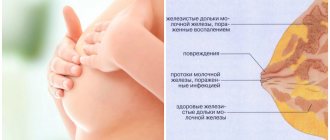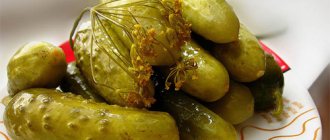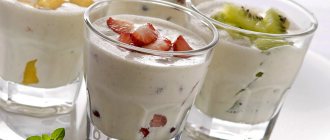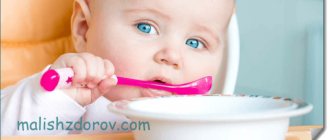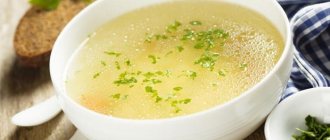Do you want to return to your pre-pregnancy size quickly and without giving up breastfeeding? For you, little tricks from Dr. Komarovsky and Elena Malysheva, as well as an easy way to speed up weight loss!
- Links to authoritative sources
Author: Kristina Lobanovskaya, doctor, practicing nutritionist Article updated: 03/16/2020
Ask a Question
Weight gain during pregnancy is determined by the sex hormones estrogen. They smoothly change a woman’s body, “depositing” fat on the waist, hips, buttocks and back. Soon after a natural birth, about 5 kg of excess weight is lost, and a couple more over the next 2 weeks.
According to statistics, 10% of young mothers return to their usual shape within a month after giving birth. The remaining 90% are forced to use diets.
It is not recommended to launch a weight loss campaign in the first few months after the birth of a child for several reasons: hormonal levels have not yet returned to normal, the functioning of the gastrointestinal tract has not been fully restored, and the child’s body is sensitive to any changes in breast milk. In the future, you can turn to special nutrition systems for nursing mothers, which help in smooth figure correction.
Why is it important to lose weight after childbirth?
The weight gained during pregnancy is bad not only for aesthetic reasons: if you don’t get rid of all the excess weight within six months after giving birth, it will not be a temporary gain, but a long-term problem. New kilograms begin to pile on the weight that is not lost on time. In the future, the situation may result in back pain, endocrine disorders, and varicose veins. Sometimes we are talking about “metabolic syndrome,” which includes diabetes, high triglycerides in the blood, critically low levels of lipoproteins and high blood pressure.
More often than others, the need to lose weight through a special regime is faced by women who became pregnant using IVF, took hormonal maintenance therapy while carrying a child, or suffer from diabetes mellitus with changes in hormonal levels.
Features of the diet during breastfeeding
A strict diet, which significantly reduces the caloric content of the diet and makes it unbalanced, is prohibited during breastfeeding. Experts offer alternative nutrition systems based on permitted foods. They demonstrate a powerful effect in weight loss without harming the child's health.
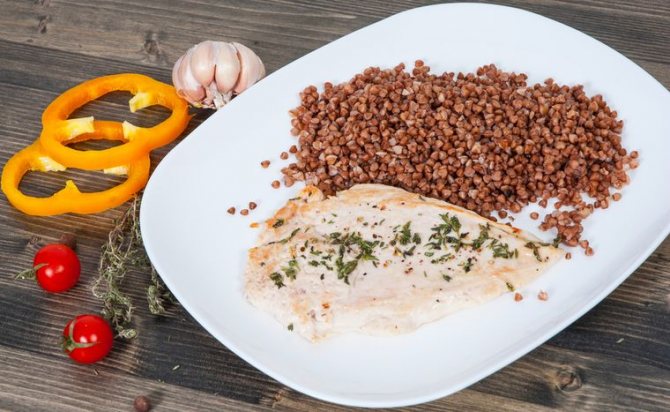
The menu of a nursing mother should consist of products that do not cause gas formation or other negative reactions in the child. This rule is the most important, but not the only one:
Meals are small and frequent
Main meals should occur about 5-6 times a day, the amount eaten should be 300-350 g per meal. A few snacks are welcome. In general, the daily amount of food should not exceed 1.5 kg. The main thing is to stop eating four hours before bedtime. Such a diet will speed up metabolism and have a positive effect on lactation.
Sufficient drinking regime
You need to drink a lot (about three liters of still water per day) and often, preferably before each feeding. There is an opinion that a nursing woman should drink tea with condensed milk or cream instead of water. It is a myth.
Adequate protein intake
Experts recommend that breastfeeding women consume at least 100 grams of protein per day. Most of it should be of animal origin.
Avoid overeating
Eating “for two” is a big mistake. The body made the reserves of microelements and nutrients necessary for full lactation during pregnancy, so during the feeding period it is important to focus not on the volume of the diet, but on its quality.
There is no need to finish your baby’s purees and porridge. As practice shows, excessive greed causes even more weight gain. It is also not recommended to try the dishes being prepared.
Taking vitamins
Vitamin complexes help enrich a woman’s body with nutrients. The pharmaceutical industry produces a wide range of vitamin and mineral complexes specially designed for the lactation period. Most Popular:
- Vitrum Prenatal Forte (12 vitamins, 9 micro- and macroelements). The drug is approved from the first day of feeding. Take one capsule per day.
- Elevit Pronatal (12 vitamins, 3 macroelements and 3 microelements). Take one tablet after breakfast.
- Pregnavit (vitamins A, B, PP, C, D3, calcium, iron). Take several times a day.
- Alphabet Mom's health (13 vitamins, 11 macro- and microelements, taurine). Take one tablet three times a day.
- Complements Mama (all necessary nutrients). Take one tablet per day during the first months of feeding.
A young mother can eat in a special way until the desired result is obtained. With natural weight loss, it takes about 8 months. A special diet regimen for a nursing mother speeds up this process.
Authorized Products
They should be present in the diet of a breastfeeding woman no matter what, as they help balance the diet, get the required vitamins and lose weight faster.
Meat
Preference should be given to fat-free varieties: chicken, rabbit, turkey, veal, beef.
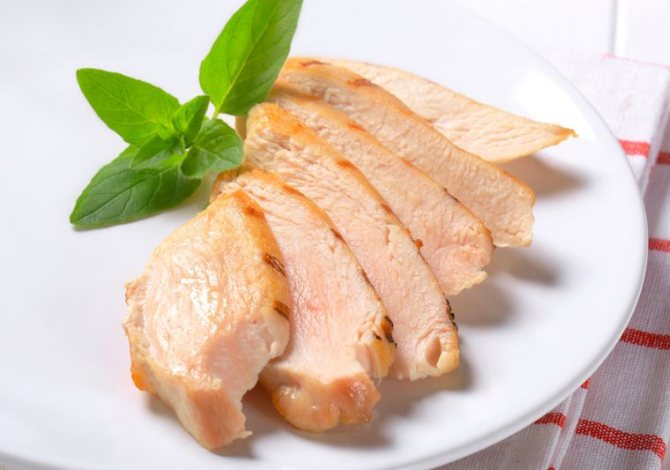
Eggs and dairy products
Saturate the body with protein and vitamins. Milk contains calcium, which is necessary for a child’s growing body: it forms the skeletal system, strengthens the immune system, and prevents constipation. A complete lack of calcium is dangerous for a child and a woman.
Vegetables and fruits
They help saturate a woman’s body with fiber, which is important for normal digestion and quick satiety. Along with it comes microelements that are of great importance during this period.
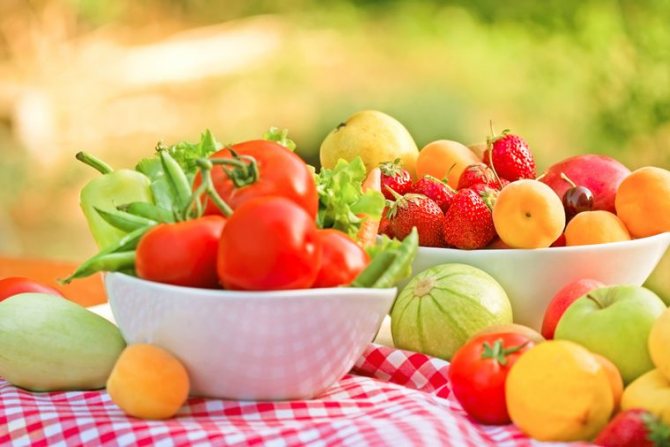
Cereals
Only pea porridge should be avoided, while corn, buckwheat, wheat and rice are very healthy. Dishes based on them should be present in the diet at least several times a week.
Prohibited Products
This list includes everything that can harm the child's health. The following are subject to exclusion from the diet of a nursing mother:
- fatty, smoked and salty dishes;
- fruits from the tropics, including pineapple;
- strong allergens (chocolate, shrimp, strawberries);
- products that cause fermentation (sugar, confectionery, grapes);
- marinades, canned food and pickles;
- onion and garlic;
- spices that negatively affect the taste of breast milk;
- coffee.
Number of calories for weight loss
Each person has his own daily calorie intake, but there is a standard - 2000. For the purpose of losing weight, the figure is reduced to 1200-1600 kcal/day. You cannot go lower, otherwise your metabolism will slow down by 45%.
The calorie content of a woman's diet during the lactation period should not be less than 1500 kcal/day. Ideally – 1800 kcal. About a third should be fat. For example, maintaining a norm of 1500 kcal, you need to get about 40 g of fat. As complementary foods are introduced into the child’s diet, you need to tighten the diet, gradually (!) reducing the fat content to 30 g.
How to lose weight while breastfeeding
During the period of bearing a child, every woman gets better. Weight gain is provoked by the sex hormones estrogens, which gradually “round out” the pregnant woman’s shape. After the birth of a baby, as a rule, 4-6 kilograms immediately disappear. Sometimes this is enough to get back into shape, but not all women are so lucky. A month after giving birth, only 10 percent of mothers lose weight naturally, while the rest have to go on a special diet.
Proper nutrition during breastfeeding for weight loss has several basic rules:
- A balanced, nutritious menu is the key to nourishing, tasty and healthy breast milk.
- A diet for losing weight for a nursing mother requires mandatory fluid intake (you need to drink 2.5 liters of water or tea per day).
- To lose weight during lactation, it is recommended to adhere to fractional meals (5-7 times every 3-4 hours).
- You should radically limit the amount of flour and confectionery products, and even better, avoid such foods during lactation.
- It is forbidden to eat canned food, fried, salty, spicy and fatty foods.
- You should not buy vegetables and fruits out of season.
- The diet menu for weight loss during lactation should not include many foods high in carbohydrates and foods that can cause gas formation.

What can you eat while breastfeeding?
Before introducing a new diet, you must first find out what you can eat while breastfeeding. Experts advise adhering to the following dietary rules for weight loss:
- You need to eat more vegetables. They contain few calories, but these products are healthy, nutritious, and contain many useful substances.
- Protein foods in the form of dairy products, fish, meat are recommended to be consumed twice a day.
- Cereal porridges can also be included in the diet menu of a nursing mother. They are well digested, provide satiety, and supply the body with carbohydrates.
- You can eat fruits and natural yoghurts as snacks between main meals.
- When a woman breastfeeds, she loses a lot of fluid. For this reason, the daily menu should include more water and dried fruit compotes. The liquid not only replenishes milk reserves, but also helps a nursing mother fight excess weight.
What not to eat when breastfeeding
To effectively lose weight for a nursing mother, you need to familiarize yourself with the list of prohibited foods in advance. If you eat “harmful” foods, there is a risk of harming the baby (this can cause allergies and other health problems). In addition to this, the weight will not decrease, the results of losing weight will be negative. A diet for weight loss when feeding an infant implies that you need to completely exclude the following foods from the diet:
- any carbonated drinks;
- alcohol;
- smoked meats, sausages;
- sauces (ketchup, mayonnaise, etc.);
- canned food;
- fatty, spicy foods;
- fast food;
- confectioner;
- instant coffee, tea bags;
- honey;
- whole milk (cow);
- pasta, potatoes (reduce to a minimum amount);
- citrus.
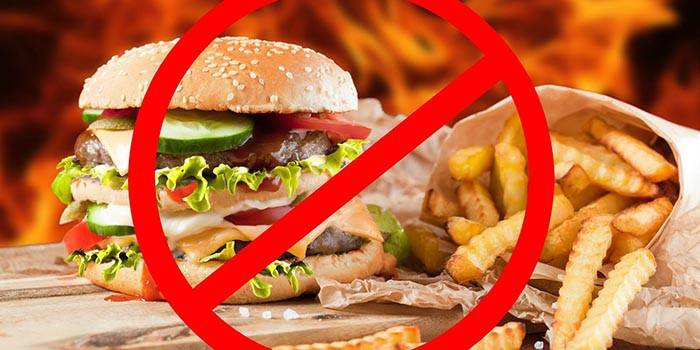
Forced power systems during hot water
Sometimes a nursing woman cannot afford a nutritional system for weight loss that requires compliance with minimum requirements due to health problems in the baby. In these cases, she has to adhere to a special diet. Its scope is important to consider when choosing a weight loss method.
Hypoallergenic
The nutrition system is strict, but effective: in a couple of months you can lose about 10 kg on it. You can prepare dishes only from products approved for consumption. Indications for a hypoallergenic food system are as follows:
- various allergic manifestations in a child (from mild diathesis to atopic dermatitis);
- diseases of the digestive tract in a baby (congenital anomalies, hereditary pathologies, etc.);
- allergic burden of the child’s heredity (in the case of the presence of allergy sufferers in the family).

A woman’s diet should be free not only from the general list of prohibited foods, but also from a number of others:
- eggs;
- honey;
- fish caviar;
- raspberries;
- citrus fruits;
- nuts and seeds;
- cocoa;
- mushrooms;
- semolina porridge.
The following are subject to restrictions: beef, chicken, meat broths, wheat and products made from wheat flour, orange and red vegetables, berries and fruits.
The daily menu might look something like this:
- Breakfast: green tea, cottage cheese casserole without sugar.
- Snack: green tea, a piece of low-fat cheese.
- Lunch: salad with peas, low-fat soup with meatballs and cauliflower.
- Afternoon snack: kefir without sugar.
- Dinner: baked or boiled potatoes, unsweetened kefir.
Dairy-free
Dairy-free is any regimen that includes an approved list of foods and excludes dairy. It is useful for children intolerant to cow's milk. It is temporary, usually up to 4 months of the baby’s life. Afterwards, a nursing mother can introduce dairy products into her diet.

Indicative menu for the day
- Breakfast: oatmeal porridge with dried fruits, cranberry jelly.
- Snack: green tea, boiled egg.
- Lunch: light soup, boiled chicken, mashed potatoes, dried fruit compote.
- Afternoon snack: dried green tea, a couple of walnuts.
- Dinner: buckwheat porridge with steamed meatballs, dried fruit compote.
It is necessary to distinguish between dairy-free and lactose-free diets. The latter is recommended for mothers whose babies suffer from lactase deficiency. Lactase is an enzyme necessary for the digestion of milk sugar. Limiting dairy products in this case will be justified only if you have a food allergy.
Nutrition for a nursing mother.
First of all, we advise you to carefully re-read the nutritional recommendations in the chapter on pregnancy. Believe me, the number of food items that are absolutely safe for both mother and child is quite large. Therefore, I sincerely urge you to experiment less. The less you consume citrus fruits, cocoa (chocolate), coffee, strawberries and other products that are fundamentally dangerous in terms of allergies, the better the baby will be. You yourself will regret it later when, after eating chocolate at the age of two, the child is covered in a rash and itches all night.
You should know: almost everything that mother eats is present in milk in one form or another. You should avoid foods that can worsen the taste of milk (salty, sour, spicy) and its smell (garlic). Some foods eaten by the mother, for example, legumes and white cabbage, have a bad effect on the child’s intestines - they increase gas formation and sometimes cause diarrhea.
The higher the fat content of the milk, the more effort it will require to digest it, the harder it will be for the baby to suck and for the mother to express. Therefore, there is no need to consciously increase the fat content of milk by consuming large quantities of fats (sour cream, pork, butter creams, etc.). Vegetable fats (sunflower, olive and corn oil) are preferable to animal fats[1].
If you do not have significant problems with your own weight, then it is very good to eat a bowl of semolina porridge in the evening. You need vegetables and fruits (at least 500 g per day), varied and, preferably, fresh and not canned. In general, the less canned food a nursing mother eats, the better.
Always monitor your child's reactions. If you are in doubt whether you can eat it or not, eat a little. Everything is fine with the child - no rash has appeared, sleep and bowel movements have not changed - eat to your health.
The question of whether a nursing mother needs to drink a lot remains controversial to this day. A huge number of scientists claim that increasing the volume of fluid you drink does not increase the amount of milk, but an equally huge number of mothers insist on the opposite.
In the end, if there is enough milk or there is some left, then you should not drink anything on purpose, against desire. But in a situation where the baby’s milk supply is not satisfactory, each feeding should end with you, having put the baby to bed, going to the kitchen, where an “orphan’s” mug with a volume of about 0.3-0.5 liters is waiting for you. By the way, night feeding should not be an exception, so it is advisable to prepare tea (compote) in a thermos in advance, so that the sleepy person does not fuss in vain.
Optimal drinks:
— tea (green is better than black) with milk, quite sweet;
— dried fruit compote (dried apricots, apples, raisins);
- juices (apple, grape, carrot), but in moderation;
- cow's milk and fermented milk products. Milk must be boiled or baked; It is optimal that its fat content does not exceed 2.5%.
There are many recommendations regarding products that increase the amount of milk (nuts, yeast, nettle decoction, beer, etc.), as well as medications that have a similar effect (nicotinic and glutamic acids, apilak, pyrroxan). But you should under no circumstances overestimate their importance.
Believe me, a healthy child and a mother who sleeps at night, who is not nervous and does not twitch over little things, contribute to the production of a sufficient amount of milk to a much greater extent than all food and medicines combined.
[1] I emphasize: this is not about eliminating fatty foods, but about eating them in smaller quantities. It is generally unacceptable to completely eliminate fats, for example, when fighting for your figure, if only because many vitamins dissolve exclusively in fats.
author Komarovsky E.O. book Child's health and the common sense of his relatives published 02/26/2010 16:04
Gluten-free diet for nursing mothers
Gained popularity all over the world. It is considered a safe way to lose weight. Does not cause harm caused by gluten. The latter refers to protein that, due to individual characteristics, is not absorbed by the body. Many experts call gluten nothing more than a “gateway” to a toxic load: by enveloping the intestines, it reduces the ability to move food, which, when delayed, begins to ferment. Subsequently, increased gas formation is observed.
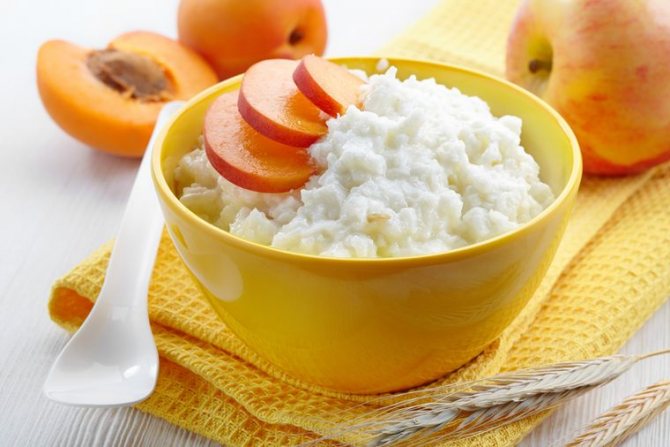
The advantages of a gluten-free food system are obvious:
- The diet remains balanced and varied, despite exceptions.
- Eating according to the rules helps the body get rid of toxins accumulated over the years.
- Fasting is excluded.
- The result is visible even with minimal effort.
Gluten can be hidden in confectionery, pasta and bakery products, ice cream, convenience foods, store-bought spices, canned meat and fish, sausages, and imitators of natural products. Wheat, oats, barley and rye are completely excluded from the diet.
Recommended for use:
- boiled, stewed or steamed low-fat meat;
- soups with weak meat broth;
- milk and dairy-free porridges made with millet, rice and buckwheat;
- boiled chicken eggs;
- dairy and fermented milk products;
- root vegetables, berries and fruits;
- vegetable and butter;
- bread and pasta substitutes;
- honey;
- berry drinks, fruit jelly, loose leaf tea.
Approximate daily menu
- Breakfast: rice milk porridge, fresh berries, loose leaf tea.
- Snack: dried fruit compote, cornbread.
- Lunch: soup in weak meat broth with rice, buckwheat pancakes, berry juice, baked fish, vegetable salad.
- Afternoon snack: fruit, still mineral water.
- Dinner: buckwheat porridge, stewed vegetables, kefir, a spoonful of honey.
In a week on a gluten-free diet you can lose from 2 to 4 kg.
Principles of nutrition for a nursing mother
In the first month after the baby is born, the mother’s diet is more strict than that of a pregnant woman. And even though mother and child are no longer connected by an umbilical cord, there is another connection - mother’s milk. According to WHO, breast milk is the most natural, safe and healthy food for a baby.
Exclusive breastfeeding for six months has many benefits for infants and their mothers. The main ones are protection against gastrointestinal infections, observed not only in developing but also in industrialized countries. Thanks to the early start of breastfeeding - within an hour after the birth of the child - the newborn is protected from infections and the mortality rate of newborns is reduced.
Breast milk is also an important source of energy and nutrients for children aged 6–23 months. It can provide half or more of a baby's energy needs between 6 and 12 months and one-third of a baby's energy needs between 12 and 24 months. Breast milk also helps reduce mortality among malnourished children.
World Health Organization
https://www.who.int/mediacentre/factsheets/fs342/ru/
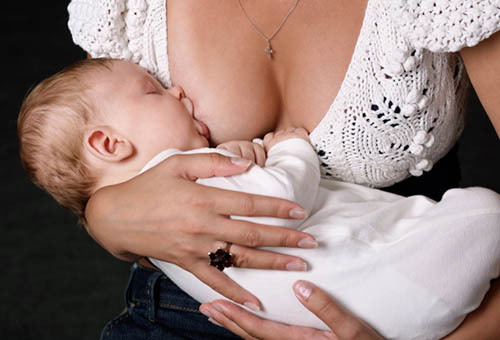
Breast milk is the most natural and healthy food product for a baby
A breastfeeding woman must adhere to 10 principles of proper nutrition:
- Nutrition must be balanced, that is, there must be the correct ratio of proteins, carbohydrates, fats: for 1 kg of weight you will need 2 g of protein, 1 g of fat, 4 g of carbohydrates.
- Food products must contain the entire complex of vitamins, especially A, E, C, D, B, and folic acid.
- Food should be rich in micro and macroelements, especially calcium, magnesium, iron, fluorine, iodine, zinc.
- Eat 2500 kcal per day, that is, increase calorie content by only 300–500 kcal, and include complex carbohydrates in your diet.
- Eat small meals 5-6 times a day. Be sure to have dinner, since at night the woman will have to feed the baby 3-4 times.
- Drink 10 glasses a day of pure water and other drinks.
- Food should be eaten boiled or steamed.
- You should not eat foods that can cause digestive problems or an allergic reaction in the child and mother:
- All fruits, vegetables, berries are red and orange due to possible allergies: raspberries, strawberries, citrus fruits, radishes, tomatoes.
- Vegetables and fruits that cause increased gas formation: white cabbage, cucumbers, grapes, legumes.
- Strong teas with additives, coffee, cocoa.
- Smoked, fatty, fried, canned foods: sausages, canned food, semi-finished products, mayonnaise, ketchup and other sauces.
- Salty, hot, spicy.
- Sweets that contain flavors and dyes, chocolate, honey, nuts.
- Alcoholic drinks and smoking must be avoided during breastfeeding.
- As the child grows older, new foods should be gradually introduced into the mother's diet. Start with a small portion of one product every three days. If the child has no negative reactions, then the product should be included in the daily diet.
Video: Nina Zaichenko’s opinion on the main principles of nutrition during breastfeeding
Protein
In honor of its creator, it is also called the Dukan diet. The essence of the technique is limited consumption of carbohydrates and the predominance of proteins in the diet. The latter are very satiating, so people who adhere to this food system are not overcome by painful attacks of hunger. Breakdowns and overeating are also kept to a minimum. Proteins spend about a third of their calorie content to burn themselves. The diet also has other advantages:
- Eating only natural food.
- Gentle effect on the body.
- No need to count calories.
- No restrictions on portion sizes.
- There is no need to eat food at a strictly designated time.
- Rule out depression.
- Fast and lasting results.

An effective diet requires adherence to the following principles:
- regardless of weather conditions, take walks for half an hour (necessary to improve metabolism);
- drink at least 2 liters of still water per day;
- consume oat bran in the amount of three spoons every day (this helps prevent constipation).
During breastfeeding, Dukan recommends losing weight according to his program, regardless of excess weight. The power system is based on several stages, following one after another:
- Attack (squirrels only).
- Cruise (proteins and vegetables).
- Consolidation (other products are added).
- Stabilization (saving the result in the future).
Pierre Dukan encourages mothers to skip the first two stages, starting with Consolidation (lasts 35 days). The weight loss effect will not be so immediate, but nothing will harm the baby’s health.
Products
There are quite a few products allowed at the “Fixing” stage:
- dairy products with fat content up to 2% (processed cheese, soft cottage cheese, curdled milk, milk, yogurt);
- meat (veal, chicken, turkey, beef, lean ham, fat-free jerky);
- kidneys and liver;
- Fish and seafood;
- eggs;
- pasta (from durum wheat);
- berries and fruits (with the exception of grapes, figs, bananas and cherries);
- bulgur, couscous, peas, rice, lentils, polenta;
- vegetables and herbs (potatoes are consumed in moderation);
- whole grain bread;
- healthy tea.
Fatty and spicy foods are completely excluded. The ban is imposed on canned food, sweets and smoked foods.
Diet features
Pierre Dukan allows mothers who are breastfeeding to deviate slightly from the usual rules of the nutrition system:
- you can eat several servings of fruit (not 200 g, but 400);
- you can have a protein day less often or abandon it completely (Dukan recommends that his patients eat only proteins every Thursday);
- holiday food can be eaten a couple of times a week;
- at the end of the last day of the diet, you can switch to your usual diet, gradually replacing the light menu with the usual one;
- you can start the morning with porridge cooked in water;
- six weeks after the end of the diet, flour and rice can be introduced into the diet.
Menu
For the first seven days, a nursing mother is advised to consume cheeses, yogurt and eggs. The products are included in salads and various dishes, and consumed separately. The number of fruits is limited to three apples. If you feel great after a week, the woman can continue to eat in the same way, adding pasta and cereals.
The third week of a nursing mother’s diet involves the introduction of foods into the diet that work to increase its diversity: fish, chicken, beef. At the same time, cheeses and yogurt are slightly limited. The fourth and fifth weeks follow the same plan.
A possible daily menu looks like this:
- Breakfast: ham, omelette, bread, tea.
- Snack: fruit.
- Lunch: fish soup, lean baked meat, salad.
- Afternoon snack: cottage cheese casserole with berries, tea.
- Dinner: stew, turkey fillet, pasta.
A nursing mother can eat according to the Dukan system without restrictions on duration, that is, until the desired weight is reached.
Diet for weight loss while breastfeeding
Everything a woman eats affects the quality of breast milk and the well-being of the newborn. Considering this, doctors strongly advise sticking to a healthy diet during the lactation period. A balanced diet consisting of healthy foods helps to actively get rid of extra pounds. A weight loss diet for a nursing mother should be well thought out, include vitamins, microelements, and have an allowed calorie content.
How many calories does a nursing mother need to lose weight?
To quickly return to a slim figure, you need to calculate how many calories a nursing mother needs. This indicator is calculated individually for each woman, but the total calorie content is no more than 1300-2000 calories. Calculations are easy; a special formula is used for this. Your weight should be multiplied by 24 (for low activity), 30 (average activity) or 44 (for the most active nursing mothers). Add 400-600 kcal to the result obtained. The result will be the daily calorie requirement for weight loss.
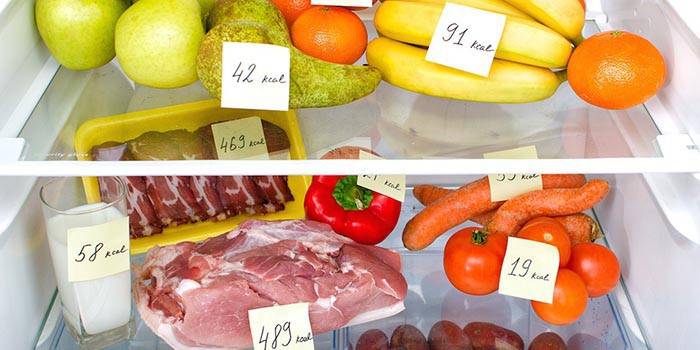
Diet for nursing mothers - list of products
As stated earlier, the menu of a woman who is breastfeeding should include only healthy foods. If you know what you can eat, it will be easy to create a new diet with delicious recipes. The list of products for a nursing mother when losing weight looks something like this:
- stewed or boiled lean meat (veal, chicken, rabbit, turkey);
- pasta, wholemeal wheat bread (do not overuse);
- dairy products: cottage cheese, hard cheese, low-fat sour cream, milk;
- fish: cod, hake, pike, pike perch, grayling;
- cereal porridges: buckwheat, millet, oatmeal;
- butter (no more than 30 grams per day);
- chicken eggs (1 piece every three days);
- olive, corn oil (15-20 g);
- fresh, stewed or steamed vegetables (zucchini, beets, carrots, pumpkin);
- compote made from dried fruits (raisins, prunes, dried apricots);
- A nursing mother can sometimes treat herself to marshmallows or marshmallows with a natural composition.
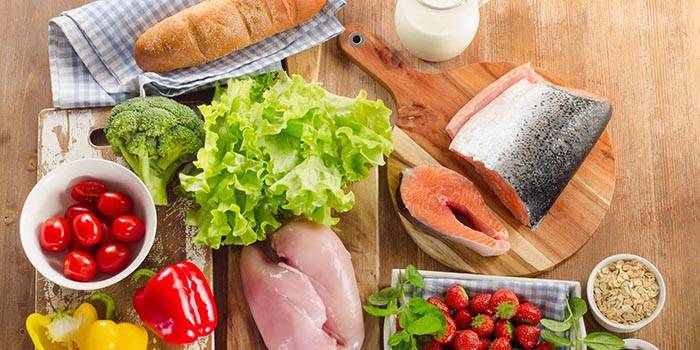
Fashionable diets after childbirth
The media often talk about weight loss methods used by celebrities. Naturally, they arouse interest among ordinary women, including nursing mothers. The question arises: are “star” nutrition systems capable of causing harm during lactation?
Rational
The diet is based on oatmeal porridge with water, poultry, fish, vegetables and fruits. Drinks allowed are tea without sugar, grapefruit and carrot juices. Hot and spicy foods are strictly prohibited, as is eating after 6 pm. It is not recommended to consume carbohydrates and proteins at the same time, but vegetables can be eaten with anything. Apples are allowed between main meals.

The daily menu might look like this:
- In the morning - boiled egg, low-fat yogurt, bacon.
- In the afternoon – stewed vegetables, baked chicken.
- In the evening - vegetable salad, jacket potatoes.
According to experts, the diet can be used without fear during breastfeeding. Thanks to separate power elements, the deposition of toxins is reduced. The diet itself is balanced, as it contains proteins, fats and carbohydrates in a harmonious ratio. Juices saturate the body of a nursing mother with vitamins and microelements; malic acid helps normalize metabolic processes.
Grapefruit
This involves eating half a grapefruit before each meal. In this case, you can leave the usual menu, but the energy value of food eaten at a time should not exceed 800 kcal (this is how much a fruit can burn).

Experts say that grapefruit is a really good ally in the fight against excess weight. It ensures rapid passage of food through the intestines, which results in less absorption of food elements into its walls. However, when breastfeeding, the “trick” is not suitable, since the fruit is classified as a strong allergen. A woman can resort to such a diet only after finishing breastfeeding.
Vegetarian
The nutritional system allows you to eat whole grains, fruits, and vegetables. An important condition is sufficient drinking regime. The ban is imposed on meat and dairy, and alcohol. The diet is quick, as you can follow it for about two weeks. The daily menu could be like this:
- In the morning – juice from apples, celery and carrots, sunflower seeds and pumpkin.
- Lunch – raw vegetables and fruits, warm water with a few drops of lemon juice.
- Evening – salad with seeds and nuts.
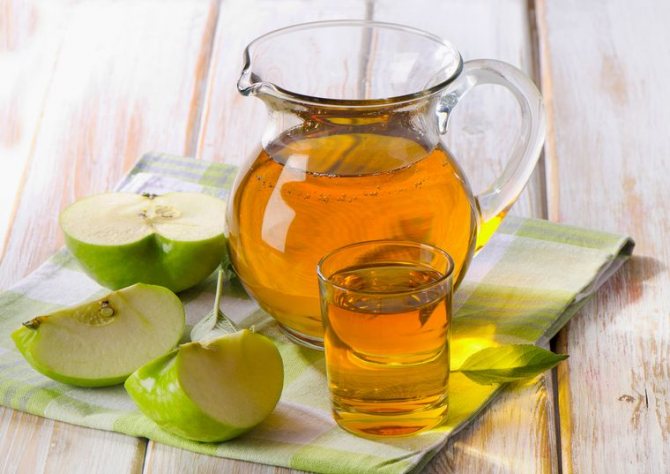
You are allowed to snack on raw carrots.
Experts consider this method of losing weight to be a raw food diet, since the products are used only in their unprocessed, raw form. Despite the tangible effect (in 15 days you can actually lose a sufficient amount of extra pounds) and a balanced diet, the nutritional system has a number of contraindications. A nursing mother can use the diet menu as a fasting day, but consume vegetables boiled or steamed. Nuts and seeds are high in calories, so the energy value of the daily diet will be at least 1200 kcal.
Is it possible for a nursing mother to diet?
After giving birth, there are a few extra pounds left and you are worried about whether and how they will disappear. The answer depends on many factors: age, heredity, the number of previous pregnancies and, of course, the nature of the increase in body weight matters. Thus, if before pregnancy you had a slim physique and weight within the normal range, you can rest assured: most women lose excess weight spontaneously or with little effort, playing sports and limiting themselves in food, within a few months.
Lactation also contributes to weight loss: the hormone responsible for milk production, prolactin, stimulates the use of fats to produce about 800 ml of milk daily. Therefore, competent and rational nutrition will be enough to bring your body back to normal. Be that as it may, during breastfeeding it is necessary to avoid both overly strict and exquisitely original regimes. During lactation, a woman needs to eat regularly, variedly and nutritiously. The diet must certainly be balanced and include all the necessary nutrients and vitamins both for the effective functioning and health of the nursing mother and for the normal development of her child. Reducing the diet can affect the quality of breast milk and its quantity, so all strict diets for weight loss and hunger strikes are prohibited.

Positive emotions and a positive mood are the basis for a slim figure and health of the whole body during breastfeeding
Before deciding to fight excess weight, mom should reduce the influence of irritating factors and put her emotional state in order. Psychological and emotional problems: bad mood, chronic fatigue and lack of sleep, excessive preoccupation with something, depression and depression - prevent the body from working properly, contribute to weight gain or prevent its effective loss.
Losing weight wisely
The average daily calorie intake for a woman is 2000–2500 kcal. A nursing mother needs to increase the norm by 400–700 kcal per day: this is how many calories are spent daily during lactation to produce the amount of milk necessary for the baby. The daily calorie intake during breastfeeding should correspond to physical activity and range from 2400 to 3200 kcal. Thus, by consuming 1800–2200 kcal per day, you can lose weight without any additional effort or dieting.
Miracles do not happen: if the amount of calories consumed exceeds your body’s needs during lactation, then the weight will increase. If these values are equal, then the mass will stand. If expenses are higher than calories consumed, then weight will begin to decrease. For lactation, no more than 500 kcal per day is required compared to the usual norm. If you are using a low-calorie diet for weight loss, then the lowest safe daily calorie level is 1800 kcal. Below this value, a lactating woman should not reduce consumption - there will already be an effect on lactation.
Yakov Yakovlev, Member of the Medical Council of AKEV (Association of Breastfeeding Consultants), pediatrician
https://akev.info/forum/viewtopic.php?f=64&t=32556

Not eating enough calories can lead to weakness and exhaustion. In this case, it will become difficult for the mother to take care of the child.
Video: does a nursing mother need a diet - expert opinion
What does Komarovsky think?
The advice of the people's doctor delights many mothers. Thanks to his practical and at the same time simple tricks, you can lose weight without harming your own body or the health of your baby. Evgeniy Olegovich developed a nutrition plan for breastfeeding women. According to him, he must be free from:
- preservatives;
- dyes;
- allergenic and fatty foods;
- chocolate and sugar;
- fast food.
Komarovsky does not impose strict prohibitions on the diet of a nursing mother, but recommends giving preference to:
- cereals;
- lean meat;
- fruits (non-allergenic);
- vegetables;
- dairy products;
- fats of vegetable origin.
As for drinks, the doctor allows:
- green tea;
- dried fruits compote;
- fermented milk and milk drinks with a fat content of no more than 2.5%.
Sample menu for breastfeeding
Based on the doctor’s recommendations, you can create a daily menu that will include a variety of foods that will allow your mother to always feel full and satisfied.
Recommended menu for 1 day - table
| Meal times | Meal options |
| Breakfast |
|
| Dinner |
|
| Afternoon snack |
|
| Dinner |
|
| Second dinner |
|
There is no need to invent new recipes or search for super-healthy products. You can simply change the methods of preparing your usual dishes, replace harmful ingredients with healthy ones, use less pepper, salt and sauces. So, I stopped frying soups: now I add onions and carrots to cook along with other vegetables. Now I marinate meat and fish not in mayonnaise, but in sour cream or yogurt (which, by the way, I make myself in a slow cooker). I steam the cutlets or bake them in the oven, although I used to fry them. I put the salad on two plates. I fill one part with olive oil for myself, the other with mayonnaise for my husband and eldest son. By the way, they themselves did not notice that their diet gradually became more correct from a health point of view. I realized a long time ago: the worst changes are drastic ones. This is when you declare: that’s it, from today no sugar (white flour, sausage, etc.). Such strict prohibitions always end with you going and eating like a pig, without measure of what you denied yourself. But by gradually replacing familiar dishes with healthy ones, you can achieve significant success. You just need to start as early as possible, and not when your beloved baby’s cheeks have turned crimson-red.
Advice from Elena Malysheva
Malysheva’s diets have gained credibility among those seeking weight loss. A nutritional system has not yet been developed for nursing mothers, but Elena offers practical advice for normalizing digestion and smoothly getting rid of extra pounds. Some of them can be used during lactation.

Not to starve
Suspecting that it is in danger of starvation, the body begins to make reserves even from meager food intake. You need to eat often, in small portions.
Count calories
The main ally of those losing weight is accurate “accounting”. At the same time, the menu should be varied.
Chew food thoroughly
Processing food with saliva and grinding it with teeth helps to enjoy the taste of food, avoid overeating and ease the work of the stomach in the future. Prepared food passes through the digestive tract more easily and is absorbed much faster.
Make water your ally
Water perfectly fills the stomach and fights hunger, having zero calories, it helps improve metabolism, removes toxins and normalizes intestinal function. Malysheva strongly recommends drinking at least 10 glasses of still water per day. It is especially important to drink 1 glass in the morning, on an empty stomach.
Do physical education
Moderate physical activity does not overload the cardiovascular system, increases alertness and helps in the fight against excess weight. Nursing mothers cannot do without them. The main thing is to choose the appropriate option.
How to make your diet more effective
An effective way to regain your previous shape after childbirth is moderate physical activity. When combined with a nutritional system for weight loss, they demonstrate excellent results, having a beneficial effect on metabolism and mood. At the same time, any exercise interferes with the successful healing of the uterus, so it is recommended to start exercising only six weeks after the birth of the child. Early activity can harm lactation!

Do not underestimate the “physical education” that comes into a woman’s life with the birth of a baby. Caring for a newborn is already exercise that can burn calories.
Mind-Body practices such as meditation, yoga and Pilates are also permitted. With their help you can transform your body at any stage of life. They have no contraindications, minimize stress, and can be easily performed at home.
The choice of load six weeks after birth must be approached rationally. The best type of physical activity during pregnancy and lactation is a swimming pool. If a nursing mother decides to go to the gym, it is important to remember to exercise without weights. Aerobic exercise is best avoided, as it promotes loss of large amounts of fluid and poses a danger to the breasts.
Reviews and results of losing weight
Oksana, 32 years old
During pregnancy I gained 20 kg. A lot, I know. The gynecologist constantly discouraged me from eating buns, but my body insistently demanded junk food. After giving birth, I lost 7 kg. During the first month, breastfeeding became lighter by another 2 kg. Of course, she was unhappy. I decided to call a diet for help. I settled on gluten-free. I heard that it is really effective. I immediately had to give up not only my favorite buns, but also sausages. In 2 months I managed to lose 5.5 kg. Since I am already accustomed to a gluten-free diet, I will continue.
Olga, 24 years old
After the birth of my son, I realized that I was completely unhappy with my reflection in the mirror. Before giving birth, I weighed 56 kg, after - 64. Friends and my mother tried to prove that breastfeeding would soon help me get in shape. But can you convince me? I started looking for a suitable way to lose weight. I chose a rational diet for myself, allowing me to eat porridge, poultry, fish and fruits and vegetables. In principle, this diet suited me. After being unloaded for a month, I became only 2 kg lighter. It's a shame, but I continue to strive for the goal.
